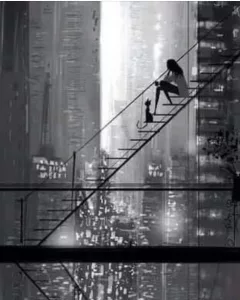cctm collettivo culturale tuttomondo Cesare Pavese Poesie giovanili
E’ triste la sera
stanca.
Ma è tanto triste
che non piange neppure.
_
It is a sad,
weary evening.
But it is so sad,
that it does not even cry.
Cesare Pavese
da Poesie giovanili, 1923-30, Einaudi, 1989.
_

immagine dal web
Cesare Pavese (Santo Stefano Belbo 1908-Torino 1950) è stato uno dei maggiori scrittori italiani del secondo dopoguerra.
È stato anche, con Fernanda Pivano, il principale traduttore di romanzi americani moderni in italiano. Grazie a lui giunsero in Italia i testi di Melville, Dos Passos, Steinbeck e Stein.
Nel 1930 si laureò in Lettere con una tesi sulla poetica di Whitman e pubblicò il libro “I mari del sud”. Nel giro di pochi anni, Pavese si trovò impegnato nella docenza, nell’editoria con il gruppo Einaudi e nella scrittura. Nel 1936, uscirono le innovative liriche di “Lavorare stanca”. Versi lunghi, quasi prosaici e dal ritmo anapestico, stravolsero la tradizione italiana.
Durante il regime, fu costretto a prendere la tessera del partito fascista per proseguire la sua attività di insegnamento. Fu comunque incarcerato e costretto al confino. L’esperienza di questi anni fu descritta nel suo primo romanzo: “Il carcere”.
Fu con “Paesi tuoi”, uscito nel 1941, che rivoluzionò la prosa italiana. Il tema e il linguaggio crudo, quasi violento, e dalle forti sfumature dialettali sancirono uno strappo con la precedente tradizione letteraria. L’opera assomigliava alla scrittura semplice e asciutta dei romanzi americani novecenteschi.
Durante gli anni della guerra, Pavese si avvicinò al partito comunista e iniziò a collaborare con «L’Unità».
Tra il 1945 e il 1949 pubblicò “Feria d’agosto”, “Dialoghi con Leucò”, “La casa in collina”, “Il diavolo sulle colline” e il suo ultimo romanzo “La luna e i falò”. Nel 1950 vinse il Premio Strega con il romanzo: “La bella estate”. Il testo è un trittico composto da tre brevi racconti, pubblicati o stesi durante gli anni quaranta.
Depresso da tempo, Pavese si suicidò la notte del 26 agosto 1950 in un albergo di Torino.
_
Cesare Pavese (1908 – 1950) was an Italian novelist, poet, short story writer, translator, literary critic, and essayist.
He is often referred to as one of the most influential Italian writers of his time.
The typical protagonist in the works of Pavese is a loner, through choice or through circumstances. Their relationships with men and women tend to be temporary and superficial. They may wish to have more solidarity with other people, but they often end up betraying their ideals and friends; for example, in The Prison, the political exile in a village in Southern Italy receives a note from another political confinato living nearby, who suggests a meeting. The protagonist rejects a show of solidarity and refuses to meet him. The title of the collection of the two novellas is Before the Cock Crows, a reference to Peter’s betrayal of Christ before his death.
The Langhe, the area where he spent his summer holidays as a boy, had a great hold on Pavese. It is a land of rolling hills covered in vineyards. It is an area where he felt at home, but he recognised the harsh and brutal lives that poor peasants had making a living from the land. Bitter struggles took place between Germans and partisans in this area. The land became part of Pavese’s personal mythology.
In The Moon and the Bonfires, the protagonist tells a story of drinking beer in a bar in America. A man comes in whom he recognizes as being from the valleys of Le Langhe by his way of walking and his outlook. He speaks to him in dialect suggesting a bottle of their local wine would be better than the beer. After some years in America, the protagonist returns to his home village. He explores Le Langhe with a friend who had remained in the area. He finds out that so many of his contemporaries have died in sad circumstances, some as partisans shot by the Germans, while a notable local beauty had been executed by partisans as a fascist spy. (Wikipedia)
_
cctm collettivo culturale tuttomondo Cesare Pavese Poesie giovanili